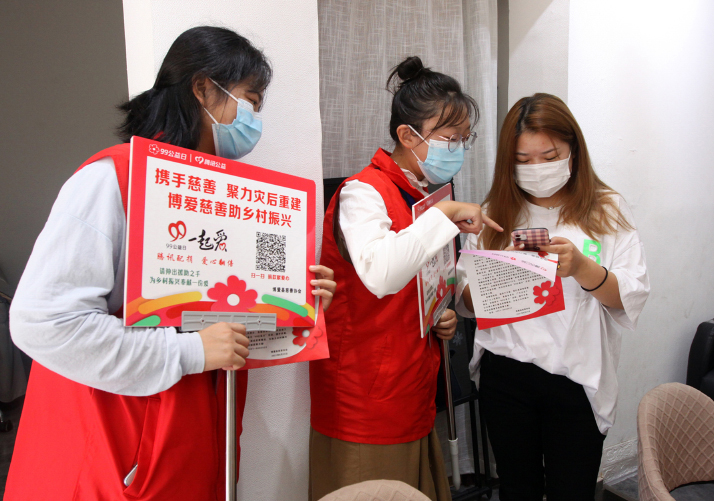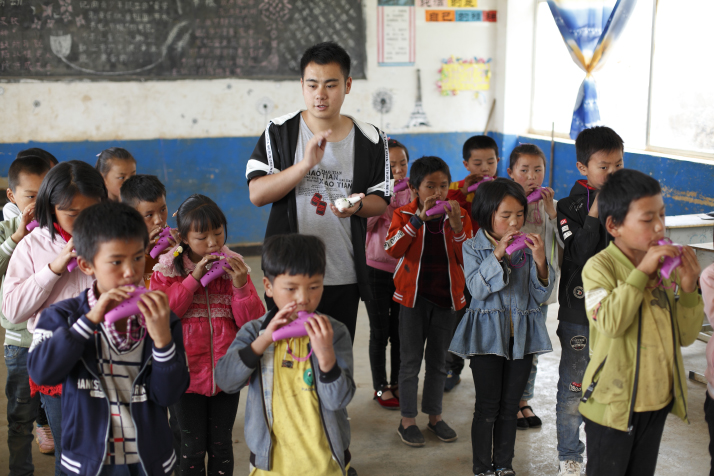| China |
| The Internet is channeling more resources into charity, changing China's philanthropic landscape | |
|
|
 A contributor makes an online donation in Jiaozuo, Henan Province, on September 8 (XINHUA)
Every early September, Ge Mingzhu, who works for a charitable organization based in Beijing, puts up 99 Giving Day posters across social media platforms to raise more fund for her organization. By using a smartphone to scan the QR code on the poster, one can donate money to the charitable projects directly; the Tencent Charity Foundation and other such organizations will add to individual donations with their own contributions. Burgeoning online fundraising The Internet, especially mobile Internet, has become an intrinsic part of life in China, driving economic growth and even the development of philanthropy. 99 Giving Day, launched in 2015 by China's tech giant Tencent, was set up with the explicit intention of encouraging philanthropy as well as improving the company's public image. Ever since, it has become an annual charitable bonanza taking place between September 7 and 9. Over the course of its six-year existence, 99 Giving Day has managed to rake in donations worth 6.2 billion yuan ($960 million). And that's just a glimpse of the burgeoning online fundraising cause. This year, this online public charity campaign was extended to cover a period of 10 days and included more interactive activities to expand its influence. Netizens could, for instance, have charitable organizations make donations on their behalf by entering their daily step count, sharing posters with friends, or even by just answering a few questions. The mass enthusiasm came with China's improving legal environment for philanthropy. In 2016, China released its first-ever Charity Law. Later, four ministries issued measures for the administration of public fundraising platform services, aiming to protect the interests of donors, beneficiaries, and charitable organizations. In the meantime, the Ministry of Civil Affairs approved several online information platforms to conduct public fundraising. China's e-commerce giant Alibaba launched its Philanthropy Week together with multiple public organizations and companies in 2017. It also called on its platforms' entrepreneurs to donate part of their profits to Gongyibaobei, a charitable campaign in collaboration with the China Foundation for Poverty Alleviation. Since 2016, a further 20 such platforms, have been approved to provide information services for non-profit organizations, covering all major online platform providers.  Liu Qiang, a teacher at Xinshan Primary School, Guizhou Province teaches his students how to play Ocarina in May 2018 (VCG)
For the public good As a popular public charity campaign in China, 99 Giving Day is bringing together enterprises, charities and contributors to address a diverse range of challenges that affect both the local and global communities, such as those involving rural education, left-behind children, animal protection, anti-desertification, and medical care for those in urgent need. In Ge's case, she works for Teach Future China (TFC), a non-profit charitable organization providing training for teachers across the nation's rural areas. This year so far, over 8,000 people have donated a total of more than 460,000 yuan ($71,162). China has been providing free normal education in its key universities since 2007. This free education program requires graduates to work in schools in China's less developed regions for a period of at least two years. To bridge the gap between universities in big cities and classrooms in rural areas, TFC provides these young graduates with systematic support to help them fit in with the rural environment and deliver whole-person education to students. On most online fundraising platforms, supporters can read all the details about the different charitable projects, such as which fund will receive the donation, who will run the projects, and what the overall plan of action is. They can also follow their project of choice to catch the latest updates. Some platforms record the public donations on blockchain to ensure no faulty alterations can be made. Chang Sheng, a 24-year-old college student majoring in journalism, noticed that a lower threshold is key to mass participation. "People know that even if they donate only 1 or 2 yuan ($0.15-0.3), they are still doing their bit for charity," he told Beijing Review. "Money aside, sharing projects on social network apps can also help gain them more attention." "For those who donate, the process is like shopping in a supermarket," said Jing Pan, TFC's chief operator, "except that the goods purchased are charitable projects." Jing told Beijing Review that online fundraising has helped her organization get more funds from everyday people, thus widening the scope of contributors. Back in 2014, when the organization was officially registered, fundraising was a tough business. Aside from a few generous givers, fundraising had to be conducted on a one-on-one basis. Today, online fundraising amounts to 10 to 30 percent of the total funds collected. "As for charitable organizations, you need to describe your project more vividly so that people can grasp your idea more easily," she added, "for example, 'Donate 20 yuan ($3) for students to get a high-quality fine art class'." This phrase is likely to draw attention because it makes a project more accessible to potential contributors. However, charitable organizations should not only rely on online fundraising platforms because the amount of money raised is decided by the number of people who read the posts, which is a non-sustainable model. Maintaining connections with traditional contributors should still receive the main emphasis, according to Jing. Jing further expressed her hopes that charitable organizations will be given the right to connect with big donors across online fundraising platforms in the future, an action currently still prohibited for reasons of privacy protection. "I totally understand some people mind other people knowing about their contributions to charity, but we really do want to communicate with them directly," Jing continued. "99 Giving Day is a yearly event, but through constant connections, we can get more support." A bigger role Online fundraising is contributing to the nation's ability to mobilize overall humanitarian aid. Data from the China Association of Social Security's (CAOSS) 2020 report show that online fundraising accounted for 20 percent of total nonprofit donations in 2019. In contrast, that number was just 0.4 percent in 2013. In the face of major social crises, online charity has also proven its worth. According to China Philanthropy Times, when COVID-19 hit China in early 2020, online donations exceeded 1.86 billion yuan ($290 million). The CAOSS report on China's online charity development said that while making donations is more convenient for those seeking to contribute, cases of fraud still occur. Moreover, although more people are donating, the average amount of donations is decreasing, adding to the costs for philanthropic organizations. Individuals soliciting help currently do not fall under China's Charity Law. But when they take their fundraising online, the law can, or should, apply. Online fundraising by individuals is more prone to dispute due to concerns over the fundraisers' credibility. Shuidichou, a platform for individuals seeking financial help in their battle against serious illness, sparked public controversy on several occasions because of credibility concerns. Tighter oversight is necessary. In addition, policies to give donors greater incentives are also called for. Liu Peifeng, a professor with the Law School at Beijing Normal University, said during a recent CAOSS seminar on the Charity Law in September that creating a sound policy environment for philanthropic organizations is the focus of any future revisions to the law. He said certain organizations have yet to be granted tax-exempt status, a problem that must be addressed as soon as possible. Additionally, Yang Lixiong, a law professor with Renmin University of China, noted that any upcoming amendments should consider the evolution of China's social structure, new models of philanthropy and a changing policy environment. He proposed giving philanthropy a bigger part in the journey toward achieving common prosperity. (Print edition title: DONATE WITH A CLICK) Copyedited by Elsbeth van Paridon Comments to maxiaowen@bjreview.com |
|
||||||||||||||||||||||||||||
|